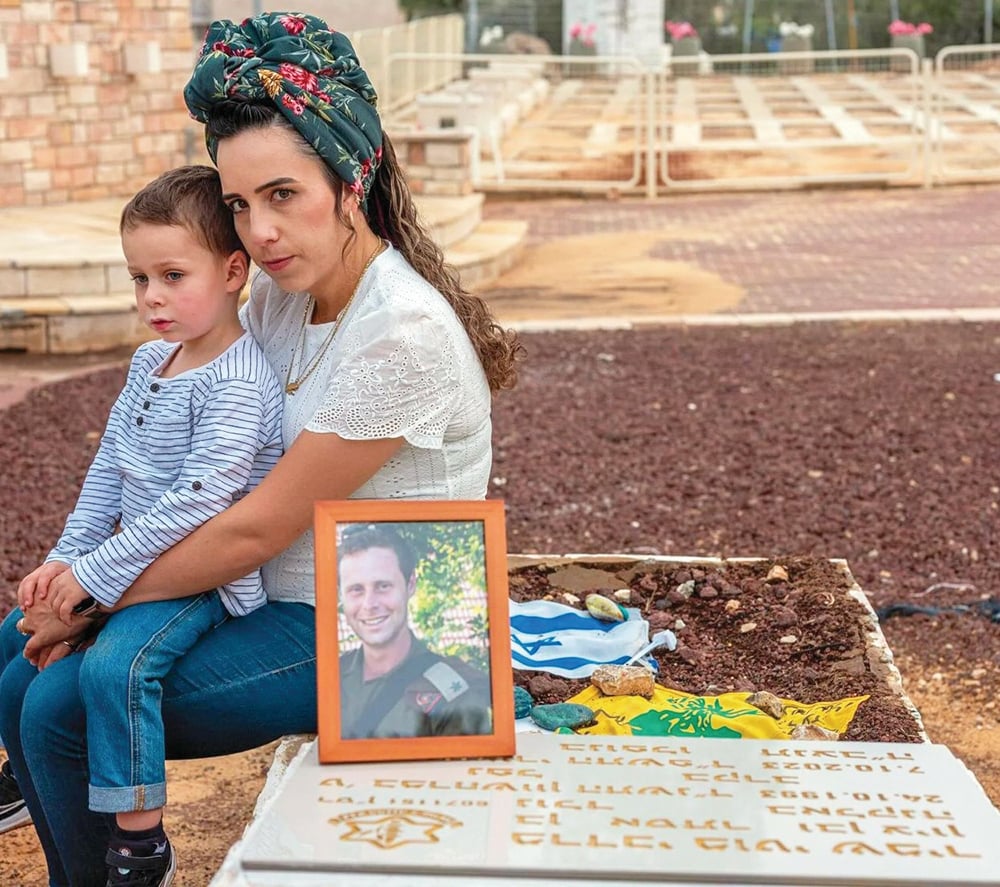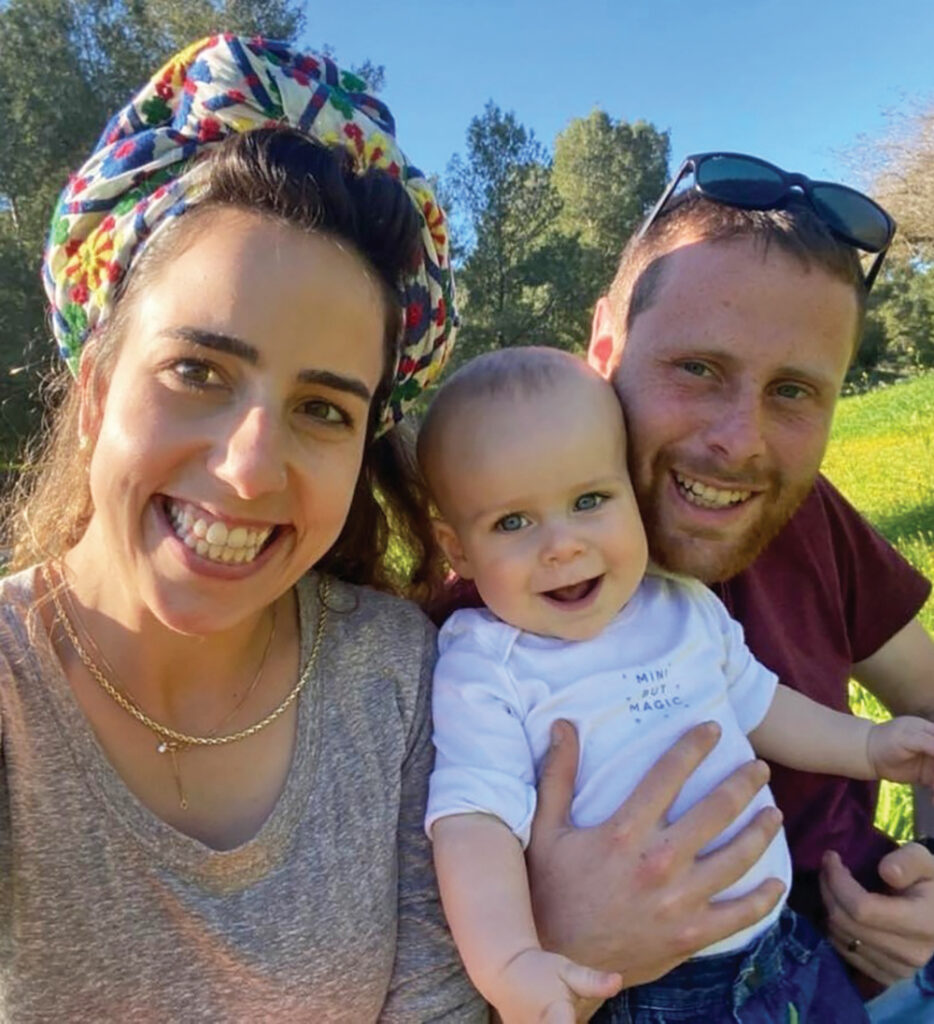
People from the Edison/Highland Park area filled a private residence on Sunday evening to hear Rabbi Moshe Rothchild speak about what lies “behind the scenes of Israel’s fight to survive” and how efforts of his nonprofit organization, Israel Alliance, have grown to include helping additional groups of people who find themselves in need as a result of the events of October 7.
Former residents of New Jersey, Rabbi Moshe, his wife Yonit and four children made aliyah 15 years ago and currently live in Efrat. While heading to synagogue services with his father-in-law on the morning of October 7 in Jerusalem, Rabbi Moshe passed a secular-looking man walking his dog; the man told him, “We are at war,” in Hebrew. Not fully comprehending and focusing on the “ch” sound of the Hebrew word for war, he initially thought the man was asking for directions to the local Chabad. Who could have comprehended the evil that was occurring a mere 120 miles to the south that would result in extended military engagement, the loss of Israeli soldiers, and so many hostages?
The uncommon sound of extended sirens in Jerusalem led to the rabbi requesting that any congregant with a gun should post outside. “It was both exhilarating and frightening to see my military-age son outside guarding the synagogue,” Rabbi Moshe said. His son checked in to see if he should return to his unit and was initially told not to. When the call came to return to his unit immediately, the rabbi’s son tried to get back to Efrat to get the rest of his military gear as he had been in Jerusalem only for the holiday. The roads were blocked and it was difficult to get where needed.

Rabbi Moshe answered the unasked question that many people had at the start of the war. The soldiers were asking for socks and underwear because many were called back to their units without having had a chance to stop and pick up supplies. The needs of the soldiers ranged from personal toiletries to sneakers and beyond. One unit of soldiers requested 15 pairs of sneakers because they needed to exercise and stay in shape but were unable to run in their army boots. Precision military watches were needed to make sure units were coordinated on the same time line, but smart watches were not permitted as they could be seen and tracked. Having operated a charity for many years, Rabbi Moshe understood the acquisition process. “There were so many items needed, so I started buying and delivering the items myself.”
Prior to October 7, Rabbi Moshe’s charities helped Holocaust survivors, poor farmers and other groups who may have fallen through the cracks of traditional safety-net programs. After October 7, new programs were added to include pregnant war widows and displaced women who effectively became single parents when their husbands were called for extended duty periods. Large families were displaced to hotels and crammed into one room. The school systems were no longer effective as many of the teachers were also away on duty. These mothers needed respite time for themselves and programming to keep their children occupied.
Rabbi Moshe’s group also strives to help the widows and pregnant women whose husbands are away. At shiva calls he heads to the kitchen, where “there is always someone connected to the family who is organizing things for the bereaved.”
The needs of each family differ; there is no “one size fits all.” At one shiva, Rabbi Moshe learned from the mother of a fallen soldier that he was the main breadwinner of the family and supported his mother, siblings with special needs and a father with medical issues. Their tiny home had no heat, so it was arranged for a technician to come and install a unit. The tradesman originally agreed to do the labor for free, and then said he wanted the mitzvah to come from him and also donated the heating unit. A widow with many children needed to move to a larger apartment to accommodate the family members who were helping her care for the children. As she is unable to handle the cost of the larger unit, Israel Alliance pays the difference. They are also helping a ZAKA member who is not only suffering from severe post-traumatic stress disorder, but injured his spine after carrying so many bodies from Kibbutz Be’eri. The ZAKA member’s wife is on bed rest awaiting their fifth child and there is no income because he is unable to work.

Not much has changed since October 8, but the intense shock has worn off. Soldiers often spend their infrequent days off attending funerals of soldiers they did not personally know. Spending a few days with family is overshadowed by the knowledge that soldiers could be recalled at any moment.
Attendees echoed Edison’s Michael Kaplan’s feelings that support of efforts such as these offer a sense of strength and unity and show the greatness of the Jewish people. Aliyana Wasserman recently returned from a Mizrachi trip to Israel where she volunteered at farms and other venues. “Amid so much heartbreak, I saw the incredible morale and enthusiasm of the Israeli people. Barry Siegel noted that “it is important to bear witness to what happened and help in whatever way possible.”
For more information, visit https://israelalliance.org/. Donations may also be sent to Israel Alliance, 2373 Broadway, Unit 1408, NY, NY 10024
Deborah Melman is a staff writer at The Jewish Link.












